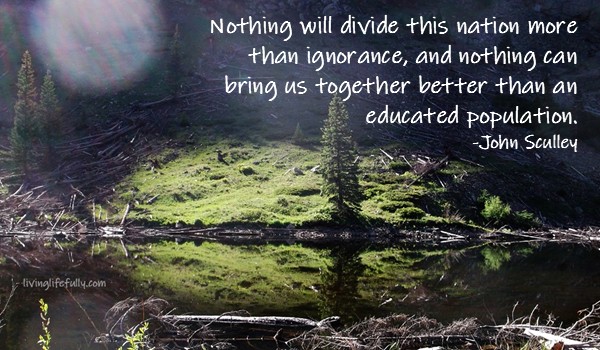of ignorance, and which would not, if we were ready
and willing to learn its lesson, lead us to a higher wisdom,
and then vanish away. -James Allen
One of the most incredible defining features of our current world is the extreme amount of ignorance to be found among people of all social groups, of all economic groups, of all nationalities. Unfortunately, ignorance has become a tool for many of the world's politicians, just as poverty has always been a tool. The politicians understand that if the population is literate, then voters will be able to recognize the lies that politicians regularly use to get elected, and then they more than likely wouldn't vote for the candidate come election time. The current situation in the United States is due to this dynamic--the quality of education in the States has been declining steadily over the past four decades or so, and as a result, we have many millions of people who are willing to accept lies as truth, and to repeat those lies to others, presenting them as "facts." They do no research on their own to find out if something is true or not, because it's easier just to believe the people who are lying to them. Something like Fox News isn't an accident--it's a carefully crafted tool designed to make people think they know facts that support one political party, while simultaneously getting them to hate and fear the "opposition," or those who don't agree with them politically.
So what do we do about this? In these days when ignorance not only has been institutionalized but also is celebrated, what can we do? Of course, as with all else we have to start with ourselves if we want to be making our lives all they can be. We need to educate ourselves, first of all, on the issues that truly matter to us. We obviously don't need to be experts on virtually everything, but we do need to be able to back ourselves up if we're going to be discussing important issues. And we need to make sure that our sources of information aren't solely those that we've chosen because we like what they say. We need to listen even to people with whom we disagree--at least, listen to them until their arguments are proven to be fallacious. Part of our research can be simply to read a certain amount of news each day, paying close attention to the sources of any information we may use to back up our own arguments. It's also important that we actually listen to opposing arguments, partly out of respect, and partially to understand exactly what the other person is trying to say.
I will always be ignorant of certain subjects. I'm not an economist, and I never shall be--but there are plenty of people who are experts in that field, and if I find some that are trustworthy, then I can have a valid opinion on the directions a national economy should go, based on what I've learned from their expertise. I don't have to have a degree in economics to have a solid understanding of what's going on in the world economically.
We don't want to be ignorant--but we have to make an effort to learn if we're going to be able to say that we're truly not ignorant. And each of us always will be ignorant of certain things--after all, ignorance is simply not knowing something, isn't it? The problem that we're facing is that ignorant people are claiming to know things that they truly don't know, and to introduce laws that support their biases and prejudices, rather than make life better for everyone. And that kind of ignorance is harming many, over and over again. This is a struggle that has to start by looking at oneself and making sure that we're doing all we can to make sure we're not part of the problem.

No comments:
Post a Comment